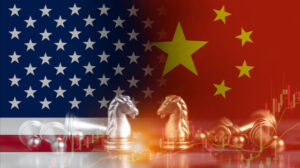As countries around the world struggle to negotiate concessions after US President Donald Trump escalated a global trade war last week, China is pursuing a different strategy.
Within 48 hours of the announcement of tariffs that shocked markets, the world’s second-largest economy responded with punitive measures of its own against U.S. products and companies.
And now it is sending a clear message: China is well prepared to withstand a trade war, and come out of it stronger.
That message was broadcast both domestically and internationally through state media and government statements over the weekend following Trump’s stunning move to attack the global trading system.
“The US tariffs will have an impact [on China], but ‘the sky will not fall’,” an article in People’s Daily, the official organ of the Communist Party of China, said on Sunday. “Since the US launched the [first] trade war in 2017 – regardless of its tactics – we have continued to grow and progress, showing resilience: “the greater the pressure, the stronger we become,” the article, which was also the newspaper’s front page headline on Monday, continued.
Trump on Wednesday announced an additional 34% tariff on all Chinese goods imported into the US, bringing the total tariff on China to more than 54%. Beijing responded on Friday with a similar basic 34% tariff on all U.S. imports, as well as other moves, including restrictions on exports of rare earths and barriers for certain U.S. companies. Of course, today, Monday, 7/4, the US President came back and in a post threatened additional tariffs on China at +50%. If he carries out his threats, the total US tariffs on China will be 104%.
Beijing has long denounced the US tariffs as “unilateral intimidation”. Its latest rhetoric may also be a propaganda tool to assuage domestic fears and project confidence internationally.
But it also reflects the likely strategic thinking of China’s leader Xi Jinping and his associates: that Trump is not just using tariffs as a bargaining chip – and that global trade turmoil may hurt the US more than China.
“Many Chinese officials believe the US is making a mistake that undermines its international standing,” wrote the Brookings Institution’s Ryan Hash on X (formerly Twitter), following contacts in China. “There is debate over whether the world is entering a bloc era or transitioning to globalization without the US. Beijing seems to prefer the latter,” he continued, stressing that “China will not allow itself to appear passive towards the US.”
Jo Jiandong, a professor at Chinghua University, added: “China and the US are now rivals in reshaping global trade. We are ready to compete.”
Challenges and concerns
However, China’s trading partners are wary of Beijing’s messages. China has used its market opening as leverage in the past. There is also fear that Chinese production will flood other markets, hurting domestic industries. Nevertheless, if US tariffs become the “new normal,” many countries may be forced to turn more strongly to China. Beijing has already begun talks with Japan, South Korea, and the EU, which were hit with 24%, 25%, and 20% tariffs, respectively.
Ask me anything
Explore related questions





